—Your Eminence, you are the director of the Youth Center of the Georgian Patriarchate. Tell us please when the center was founded, and why.
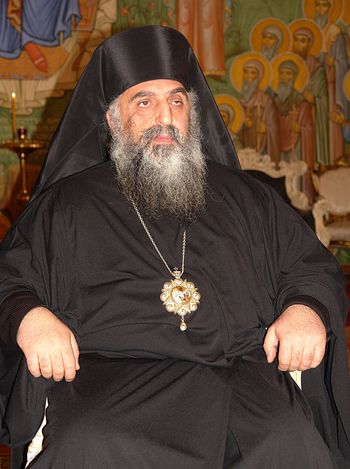 |
The youth center has many functions. It all depends upon the interests of the young people. They chose what interests them the most. Some only come to the talks, while others participate in projects. We have ongoing programs like, for example, “Educational Talks”. The theme of these talks is varied: philosophy, theology, and history. There are such interesting themes for young people as man and nature, Christian family and its problems, and problems of child education. We also show films on Sundays, and often have literary evenings. We invite scholars, writers, and other interesting people.
Besides that, we have a competition called “We Study the Bible,” which has acquired the character of a Georgian championship. Every year about 500 Georgian schools participate in it. The teams compete with each other in their knowledge of the Holy Scripture. The first stage is at the schools and the winners go to the district competitions, then regional, then semi-finals and finals. The finalists are given prizes: first prize is a pilgrimage to Jerusalem, second and third prizes are a pilgrimage to the historical Tao-Klardjeti province of Georgia (the modern-day territory of northeastern Turkey), and fourth to seventh place winners receive a pilgrimage to the holy places of Georgia. This competition draws great interest from the young people, and many participate. Sometimes it gets so emotionally charged that we have to calm the young people down. We remind them that we are dealing with Holy Scripture after all, and we call upon them not to get so passionate about the contest. If conflicts arise, there is an appeals system. We try to make the contest as fair as possible. The game is divided into three rounds. The first round includes questions from the Old and New Testaments, the second round is more complicated, and the third round is between the captains, who are given just fifteen seconds to answer questions. The children really like this, and they cheer each other on. We are conducting the fifth competition this school year, and all of Georgia is participating.
There is also the contest, “drawings on Biblical themes”. First they are asked to read some verses of the Bible, and then draw a picture based on the story. That is the first stage. In the second stage, all the participants gather in the Holy Trinity Cathedral and draw pictures of a given theme that they do not know beforehand. The third stage is homework. All the work is gathered up and reviewed by a special committee that chooses the winner.
We also conduct an educational/practical conference called, “Faith in our lives”. The children write papers on various themes. All their work should be well-written and scientifically formulated to the best of their ability. We receive many papers and we check them; we invite the authors of the papers that deserve particular interest to public presentations in the conference hall of the youth center, and then publish the winning papers. We have a special publishing house for this. We have already published one volume and are working on another. We also conduct scholarly and student conferences, exhibitions, meetings, and so forth.
—What are your plans for the near future? Are you able to accomplish them all? 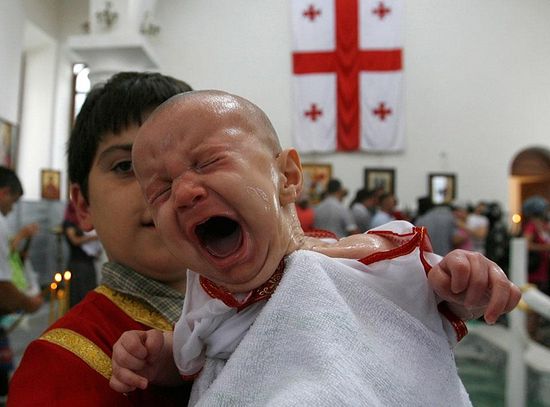
—Everything I’ve talked about takes place in Tbilisi; I would like to be able to do this in the outlying regions. We would like to have centers in every region to attract the youth, taking into consideration regional interests, and we are ready to coordinate and help them in their work. We were not able to realize certain programs—I don’t want to speak of them yet, but we are working on them and developing them, taking into consideration the difficulties that have arisen.
—Despite his busy schedule, Patriarch Ilya meets regularly with the youth. What do they talk about during these meetings?
—Yes, meetings with the Patriarch take place regularly; the Patriarch tries to be closer to the youth. The themes are varied. For example, they talk about the problems of education. The Patriarch teaches how to behave in difficult life situations, and gives advice. These meetings take place in the form of a dialogue; sometimes the Patriarch himself asks the young people about some specific issue. Often relevant topics are discussed. In the hall where these meetings take place there are no empty seats. The young people stand in the aisles, or wherever they can. Often we do video translations of these meetings so that people can watch outside the conference hall. The Patriarch’s words mean very much to the youth.
—Do you discuss the demographic problem? 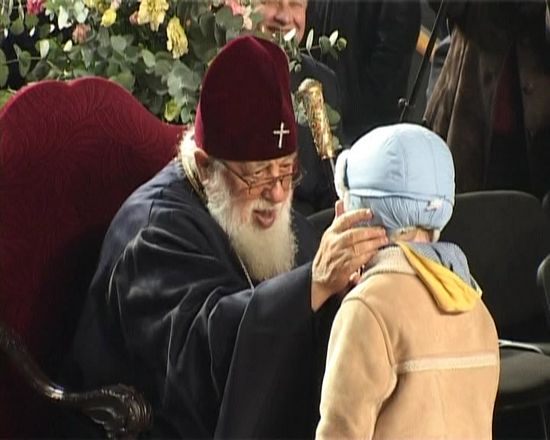
His Holiness Catholicos-Patriarch Ilya II of Georgia.
—Yes, we do. The demographic problem is a serious problem. There are a few important points here. It mustn’t be thought that the material side is the most important side. There is also the psychological aspect. You simply have to want your nation to multiply. You probably know that His Holiness Patriarch Ilya is calling us to this. He becomes the godfather to every third child that a family has. This step taken by the Patriarch has inspired a real desire in people to have many children, and has brought very great results.
There is also the question of bioethics and of contraception. The propaganda machine and various shady businesses are directly aimed against demographic increase. Everyone knows that the so-called “planned families” do not lead to any good. The use of contraceptives and planning families, which basically means control over the birth rate, is taken to be a solution to the demographic problem. Unfortunately, up until very recent times, the Georgian population tended toward a decline. His Holiness the Patriarch’s initiative has put a damper on this process. Perhaps there is an over-population problem in some countries, but the situation in Georgia is absolutely to the contrary. And although the UN is stimulating a population reduction of the whole planet out of fear of over-population, we should act in the interests of our own citizens. There are not so very many of us as could cause a crisis. It is in our interests to increase our population. Therefore we should have our own political stance on this question. Appeals and exhortations are not enough. We conduct meetings and lectures on this theme; we have had meetings and lectures about this—we have conducted several scholarly conferences dedicated to the demographic problem.
—What steps have you taken against abortion? 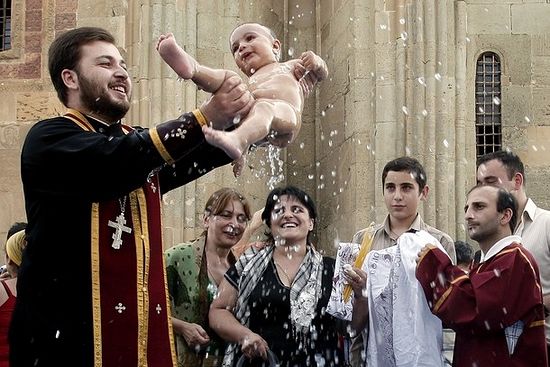
Baptizing an infant in Georgia.
—Usually those who call for contraception represent themselves as being against abortion. I ask them: What is the difference between cutting off life in the initial stages and having an abortion? Therefore, in coming out against abortion, you have to come out against contraception as well. You also have to talk about how both contraception and abortion are hazardous to health. These are essentially a step taken against God, and that never brings forth good fruit. Therefore I think that this problem should be looked at very seriously on the governmental level also. It is in the government’s interests. The government should be interested in the population’s increase, and it should make that increase possible.
—Has the situation changed at all in Georgia? Is the number of abortions decreasing?
—Such matters are not resolved in two or three weeks. The actions of His Holiness the Patriarch (about which I spoke earlier) have changed the situation, and there is progress. But there has not yet been a radical change, because there have been no steps taken by the state. I do not know how the new government will act to resolve this problem; there is hope that steps will be taken in the country’s interests.
—All the hierarchs of the Holy Synod of the Georgian Orthodox Church often talk in their sermons and circulars about labor, love for the earth, love of the motherland, and the laziness of the youth. What do you think about these problems? 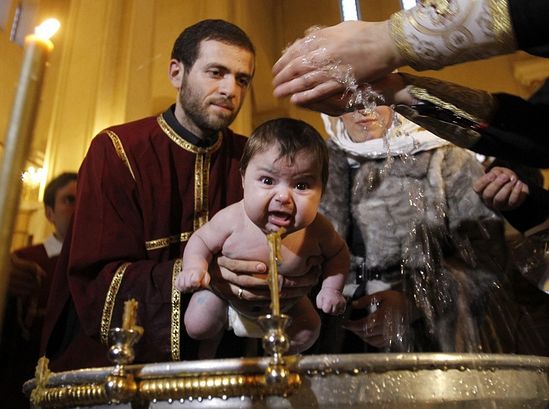
—In my opinion, the laziness of the youth is the result of the government’s wrong politics. If a young person has the opportunity to realize his talents, then there will not be such a problem. Here is how it was for us: Several juvenile drop-outs received high governmental positions, while the situation for the rest of the young people remained uncertain. All the young people tried to receive a higher education regardless of the fact that the educational reforms have not produced the expected fruits. So, even those who have received a higher education cannot realize their talents. It is becoming increasingly difficult to find one’s place in society. Perhaps this is connected with the fact that our economy and businesses are developing in only one direction. The problem lies in the fact that the majority of the youth are studying economics and law. The graduates of these university departments do not always meet the required expectations. Moreover we have a dearth of specialists. The “brain drain” from our country is a serious problem. There is also the problem of dilettantism. I think that the politics of the state in the sphere of education must change. A person does not have the possibility of receiving a professional technical education because there are very few technical institutes of higher education. I am not a specialist in this field and cannot say how specifically this should all be organized. Those people who know how to solve these problems should work on this.
—What role does the Church play in resolving these problems?
—The Church’s role is to preach the truth. When a person relates to any work with faith he strives to be sincere before God, before the state, and before every other person. Therefore, such people are very responsible and capable of self-sacrifice. Unfortunately it often happens that religious young people are not needed.
—Vladyka, in your sermons you often come out against liberalism. I think that you are right, because liberalism is destructive to society. In your articles you call upon society to wake up. Here are your words: 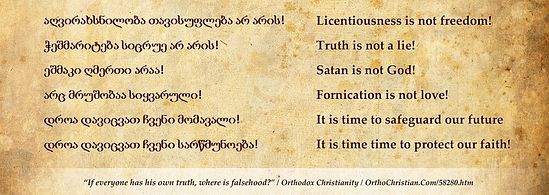
“Licentiousness is not freedom!
Truth is not a lie!
Satan is not God!
Fornication is not love!
It is time to safeguard our future, time to protect our faith!”
Please explain your position.
—Yes, that is all true. We have to remember that today the world wants to prosper without God. Both communism and liberalism are false ideas; they deceive man, falsely assuring him that we have to build heaven on earth. There will never be heaven on earth. We have to come down to earth and live there without “isms”, doing ordinary work and following the commandments of God. I talk about liberalism as a philosophy and a forced politic of a denial of absolute truth. Liberalism as an economic system I basically support, but not bald-faced libertarianism. I am not against the defense of human rights—those rights given to man by God. But there are such “rights” that are not really rights, but rather sins and illnesses. Liberals come out in support of homosexuality and call those people who talk about the harm of homosexuality “homophobes”. Homophobia is fear or hatred of man. I ask: Just because we exhort men not to marry other men and women not to marry other women, does that mean we are homophobes? After all, this leads to a dead end. It prevents the development of humanity. Homosexual families cannot give birth to children. Look at what your conscience tells you. When unconscionable behavior becomes the law, problems arise by themselves. There is no hatred of such a man in my words. To the contrary, I grieve for them, and by no means do I call for any violence against such people. The Church always grieves for such people and calls them to salvation and purification; and when necessary—to treatment. I do not understand why a call to salvation and purification is called “homophobia”. I call on homosexuals to take a hard look within and overcome themselves; but if they want to live in sin, we cannot change them. Homosexuality is fornication to an extreme degree. Why do we struggle with those who fornicate with women? Why not protect their “rights”, or the “rights” of pedophiles? It is just not normal. It leads to insanity. Mankind cannot live that way; it will lead mankind into a dead end.
The principle of liberalism is like this: absolute truth does not exist. Liberalism has a truth of double standards, because truth for it is relative. No matter what some person thinks, I am supposed to accept it as truth—just because that is what he considers to be the truth. The question arises: If everyone has his own truth, then where is a falsehood? Falsehood hides behind the guise of truth. They say to us: Every person has his own truth, we should respect everyone’s opinion and have no right to express any opposition to his error because that would be “intolerant”. Then where is Truth? Have we erased it? God is absolute Truth. Other religions in Georgia [besides the prevailing Orthodox Christian religion] have never been persecuted here. But we do say that they are not true. Saying this is not a crime and not a lack of love. To the contrary, when we talk about their errors and try to correct them, we are showing our love for them. We tell them with love: If you continue along this unstable path you will perish. You are the image of God, but you have lost God. Come to God! Liberalism will not save you, but Christ will.
